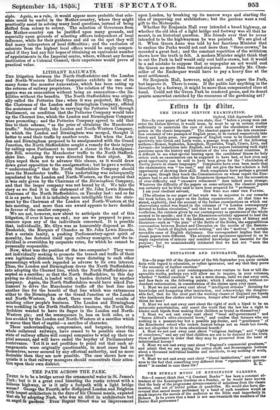Pflug to th
THE INDIAN SERVICE EXAMINATION.
Oxford, 13th September 1855.
SIR—In your paper of last week you state, that " before a young man can enter the Indian Service, it would seem, he must be up in certain studies sufficiently to undertake the cure of souls and the elucidation of knotty points in the classic languages." The classical papers of the late examina- tion consisted of two passages of English prose, to be turned respectively into Greek and Latin prose, two passages of English verse to be translated re- spectively into Greek and Latin verse, a passage from each of the following authors—Homer, Sophocles, Xenophon, Ilyperides, Virgil, Cicero, Livy, and Juvenal—for translation into English, and two papers containing each eight questions upon the history and literature of the two classical countries. It is difficult to see what special bearing upon the candidates' fitness for holy orders such an examination can be supposed to have had, or how even any great opportunity can be said to have been given for the " elucidation of knotty points in classic languages." Complaints have even been made that the examination was " too easy," and did not give the best scholars a full opportunity of showing their skill. Such complaints have perhaps a ground to go upon, though they touch the Commissioners on whose report the Exa- miners had to act rather than the Examiners themselves; but the accusation of over-difficulty and " excessive refinement" does indeed seem strange. Whatever the difficulty of the papers on some subjects, the classical papers can certainly not be truly said to have been prepared for " professors."
[The allusion in our paper of last week was in sequence to our remarks the week before, in a paper on the Indian examinations. At that time we stated, explicitly, that the account of the Indian examinations on which our observations rested was found in the columns of "a London contemporary devoted to Indian circulation," and that we had not seen the papers. Ne- vertheless, the extracts given by our contemporary as specimens of the whole seemed to be specific ; and if so the Examiners certainly appeared to lead the candidates for admission to the Indian service into byways of history and literature—such as "the plan" of the Battle of the Books, the supposititious conversation between Burnet and Clarendon on the results of the Restora- tion, the "sketch of English novel-writing," and the " motives" in certain recondite cases of English diplomacy. Our correspondent implies that the classic papers were different. The account and specimens appeared to us to imply expectation of minute and ramified knowledge not essential for the purpose ; but we unmistakeably intimated that we had not "seen the papers."—En.]


























 Previous page
Previous page